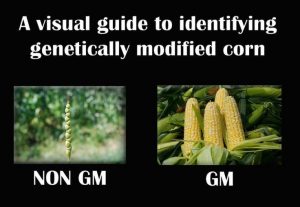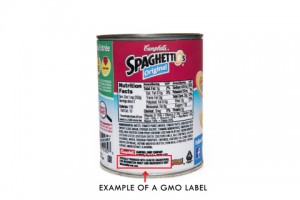Sep
01
2016
 It is amazing how a rigid ideology can so dramatically alter one’s perception of reality and justify bad behavior. Consider the following summary of events:
It is amazing how a rigid ideology can so dramatically alter one’s perception of reality and justify bad behavior. Consider the following summary of events:
One side of the GMO debate opposes the use of seeds that were created in the public interest and given freely to farmers, without any corporate ownership or profit motive. These plants dramatically reduce the use of pesticides and reduce loss due to pest damage.
The activists on this side don’t have any facts at all to back them up, so they willfully spread lies and misinformation, spread propaganda as if it were journalism, and make personal attacks against those on the other side. Yet, they still think they are the good guys.
The Anti-GMO Narrative
The anti-GMO narrative – and that is what it is, a story – has several consistent elements. According to this narrative GMOs are poisonous, bad for farmers, and solely promoted by companies out to make money by controlling the food source and exploiting farmers and the public. The problem with this cartoon is that it does not comport with reality.
Continue Reading »
Jul
14
2016
Framing is a very interesting and intellectually critical concept. It is part of metacognition, the act of stepping back from the details of your beliefs and arguments to think about the nature of the thinking itself. Framing is meta-debate, where you think about the context of the debate itself, not just the details.
Framing can also be used, either consciously or inadvertently, to control a debate or discussion, to set up the parameters so that they favor one position.
A recent article in The Conversation discusses the framing of the GMO (genetically modified organism) debate. It’s an interesting article that definitely makes me think about how the GMO discussion should be framed, although I do not agree with the author, Sarah Hartley’s, take.
Continue Reading »
Jun
27
2016
“You’re unhappy. I’m unhappy too. Have you heard of Henry Clay? He was the Great Compromiser. A good compromise is when both parties are dissatisfied, and I think that’s what we have here.”
– Larry David
Senate Democrats and Republicans have reached a compromise on the issue of mandatory GMO labels. I am not happy with the outcome, but it could have been worse. Apparently pro-labeling advocates are unhappy too.
Last year the House passed a bill that would preempt mandatory labels. That bill stated:
(Sec. 101) This bill amends the Federal Food, Drug, and Cosmetic Act to require the Food and Drug Administration (FDA) to continue the voluntary consultation process established under the FDA’s “Statement of Policy: Foods Derived from New Plant Varieties.” In that process, the FDA evaluates a scientific and regulatory assessment provided by the developer of a food produced from, containing, or consisting of a plant that is a genetically engineered organism (GMO).
The FDA may require a GMO food to have a label that informs consumers of a material difference between the GMO food and a comparable food if the disclosure is necessary to protect public health and safety or to prevent the label from being false or misleading. The use of a GMO does not, by itself, constitute a material difference.
This was a reasonable bill, which acknowledges that the way a food is produced saying nothing directly about the safety or other properties of the end product. A GMO can be perfectly safe, and a non-GMO can be unsafe.
Continue Reading »
Jun
14
2016
 Scientific skeptics spend a great deal of their time and effort fighting against pseudoscience, ideology, and entrenched beliefs. This can be a frustrating effort, given that such beliefs tend not to be based in scientific thinking in the first place. It can be so frustrating that Marc Crislip chose as the symbol for the Society for Science-Based Medicine an image of Sisyphys endlessly pushing a rock up hill.
Scientific skeptics spend a great deal of their time and effort fighting against pseudoscience, ideology, and entrenched beliefs. This can be a frustrating effort, given that such beliefs tend not to be based in scientific thinking in the first place. It can be so frustrating that Marc Crislip chose as the symbol for the Society for Science-Based Medicine an image of Sisyphys endlessly pushing a rock up hill.
I do think we are having a significant impact on culture, the media, and the bigger conversation on scientific issues, but it is hard to measure, and sometimes even perceive, that impact. The noise of pseudoscience can seem overwhelming. We are mostly left to imagine that the situation would be much worse without our efforts and take comfort in small victories.
This is why I took notice of a recent article by Risk-Monger that claims we have changed the dynamic with respect to public opinion about genetically modified organisms (GMOs). He makes an interesting case that there has been a “Surprisingly Sudden Demise of the Anti-GMO Movement.” Here is his summary of the evidence: Continue Reading »
May
05
2016

Donald Trump is the last Republican standing, which means he will be that party’s nominee. I know is this a studiously non-political blog, but this is an issue that transcends politics.
It doesn’t matter if Trump is left, right, liberal, conservative, libertarian, progressive, Democrat or Republican (he seems to be all of those things, sometimes in the same sentence). It doesn’t even matter if he is a Washington insider or outsider.
What should interest American voters the most is that Trump is an arrogant conspiracy theorist. He is an antivaccine loon. Worse, as I pointed out before, he has been publicly corrected on his incorrect views about vaccines for at least a decade, and shows no evidence of modifying his views.
He also (no surprise) denies human-caused global climate change, and even then just loosely parrots standard talking points and gets them wrong. He flirts with 911 truth. He famously is an Obama birther.
Continue Reading »
Apr
21
2016
 Eric Gimenez, writing for the Huffpo, recently wrote a typical anti-GMO piece, hitting many of the common themes. He focuses on the GMO banana with enhanced vitamin A, but his article reflects the poor logic, tortured arguments, and general anti-science of the anti-GMO crowd.
Eric Gimenez, writing for the Huffpo, recently wrote a typical anti-GMO piece, hitting many of the common themes. He focuses on the GMO banana with enhanced vitamin A, but his article reflects the poor logic, tortured arguments, and general anti-science of the anti-GMO crowd.
The GMO Banana
I wrote about the GMO banana controversy here. Bananas are a staple crop in parts of the world, including East Africa where it can represent up to 70% of calories consumed. Vitamin A deficiency is also common in this region. According to National Agricultural Research Organization (NARO) acting director Dr Andrew Kiggundu, 52% of children under five in Uganda suffer from Vitamin A deficiency, while iron deficiency accounts for 40% of deaths in this age group.
The idea is to engineer a banana cultivar native to the region so that it produces more beta carotene and iron. The cultivar is already adapted to the region, and the locals are already heavily growing and relying upon this staple crop.
Further, the GMO is being developed by the Ugandan government, NARO, the Bill & Melinda Gates Foundation and the U.S. Agency for International Development (USAID). This is primarily a humanitarian project created by the local government and farmers.
Continue Reading »
Apr
12
2016
 This is an article from 2010 but it is making the rounds again: 8 Reasons GMOs are Bad for You. The article is published on the organic authority website. It is full of misinformation, but does accurately demonstrate two things – the organic industry is largely behind anti-GMO propaganda, and they are willing to lie and distort the truth in order to attack their competitors.
This is an article from 2010 but it is making the rounds again: 8 Reasons GMOs are Bad for You. The article is published on the organic authority website. It is full of misinformation, but does accurately demonstrate two things – the organic industry is largely behind anti-GMO propaganda, and they are willing to lie and distort the truth in order to attack their competitors.
Let’s take their 8 points one-by-one:
- The health consequences of eating genetically modified organisms are largely unknown.
This is clearly the main point of anti-GMO fearmongering, that they have not been proven safe and have unknown risks. This misinformation campaign has clearly been effective. According to a Pew poll:
A minority of adults (37%) say that eating GM foods is generally safe, while 57% say they believe it is unsafe. And, most are skeptical about the scientific understanding of the effects of genetically modified organisms (GMOs) on health. About two-thirds (67%) of adults say scientists do not clearly understand the health effects of GM crops; 28% say scientists have a clear understanding of this.
Continue Reading »
Mar
04
2016
 What would happen if the US or the world banned the use of GMO (genetically modified organism) crops? A new study out of Purdue addresses that question.
What would happen if the US or the world banned the use of GMO (genetically modified organism) crops? A new study out of Purdue addresses that question.
The authors estimated the reduction in yields for corn, soybeans, and cotton if GM traits were abandoned. They then plugged the results into a well-established model of how much additional land would be needed to make up for that reduction in yield. They found:
Eliminating all GMOs in the United States, the model shows corn yield declines of 11.2 percent on average. Soybeans lose 5.2 percent of their yields and cotton 18.6 percent. To make up for that loss, about 102,000 hectares of U.S. forest and pasture would have to be converted to cropland and 1.1 million hectares globally for the average case.
The most significant environmental footprint of agriculture is land use. Every hectare (2.471 acres or 10,000 square meters) of forest or pasture that you convert to farmland increases carbon in the atmosphere contributing to global warming. Further, converting land to farmland reduces natural habitat or land for grazing.
Continue Reading »
Jan
22
2016
 I hadn’t planned on writing about GMOs again today, but I received an e-mail from a listener of the SGU which nicely represents common misconceptions that many people have about genetically modified organisms and farming in general. These are common anti-GMO talking points, which is why they are so widespread.
I hadn’t planned on writing about GMOs again today, but I received an e-mail from a listener of the SGU which nicely represents common misconceptions that many people have about genetically modified organisms and farming in general. These are common anti-GMO talking points, which is why they are so widespread.
That even thoughtful skeptics have these concerns is testimony to the successful misinformation campaign waged by the anti-GMO movement, which is largely the organic lobby and some in the environmental movement, such as Greenpeace.
The strategy here is also clear – whenever you deal with one misconception about GMOs, opponents just slide over to another point which becomes the “real” reason they are against GMOs. The experience is identical to arguing with those who reject the claims of anthropogenic global warming, when forced to give ground on one factual claim (OK, maybe the Earth is warming), they just retreat to another (but do we know that this is bad?).
Continue Reading »
Jan
11
2016
 Campbell Soup has just announced that they are switching sides in the GMO labeling debate – they are now in favor of federal mandatory labeling for all products that contain genetically modified organisms. This has perhaps opened up a new chapter in the debate.
Campbell Soup has just announced that they are switching sides in the GMO labeling debate – they are now in favor of federal mandatory labeling for all products that contain genetically modified organisms. This has perhaps opened up a new chapter in the debate.
In response Mark Lynas, a journalist who, after researching the topic, is staunchly pro-GMO, has responded with an interesting essay agreeing with this move by Campbell.
Let me state up front that I think the answer to mandatory labeling is no, but let me also walk you through my thinking on this complex issue.
The Scientific Case Continue Reading »
 It is amazing how a rigid ideology can so dramatically alter one’s perception of reality and justify bad behavior. Consider the following summary of events:
It is amazing how a rigid ideology can so dramatically alter one’s perception of reality and justify bad behavior. Consider the following summary of events:

 Scientific skeptics spend a great deal of their time and effort fighting against pseudoscience, ideology, and entrenched beliefs. This can be a frustrating effort, given that such beliefs tend not to be based in scientific thinking in the first place. It can be so frustrating that Marc Crislip chose as the symbol for the
Scientific skeptics spend a great deal of their time and effort fighting against pseudoscience, ideology, and entrenched beliefs. This can be a frustrating effort, given that such beliefs tend not to be based in scientific thinking in the first place. It can be so frustrating that Marc Crislip chose as the symbol for the 
 Eric Gimenez, writing for the Huffpo, recently wrote a
Eric Gimenez, writing for the Huffpo, recently wrote a This is an article from 2010 but it is making the rounds again:
This is an article from 2010 but it is making the rounds again:  What would happen if the US or the world banned the use of GMO (genetically modified organism) crops?
What would happen if the US or the world banned the use of GMO (genetically modified organism) crops?  I hadn’t planned on writing about GMOs again today, but I received an e-mail from a listener of the SGU which nicely represents common misconceptions that many people have about genetically modified organisms and farming in general. These are common anti-GMO talking points, which is why they are so widespread.
I hadn’t planned on writing about GMOs again today, but I received an e-mail from a listener of the SGU which nicely represents common misconceptions that many people have about genetically modified organisms and farming in general. These are common anti-GMO talking points, which is why they are so widespread. Campbell Soup has just announced
Campbell Soup has just announced




